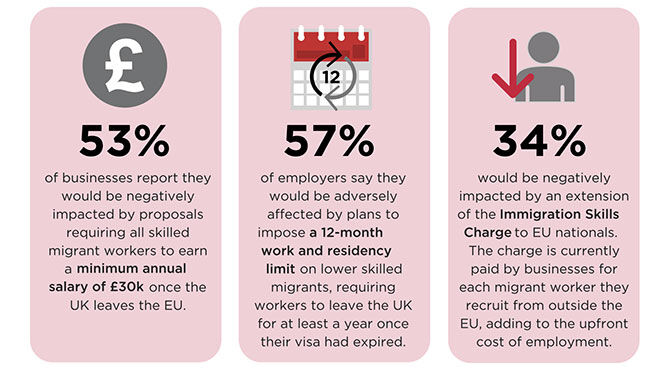UK immigration plan 'will worsen skills shortages'
Government proposals for a post-Brexit immigration system could worsen the existing skills shortage of many businesses in the UK, according to a survey published on Tuesday.

Indeed and British Chambers of Commerce.
 9 July 2019
9 July 2019UK businesses: negative impact by the Immigration Skills Charge
The survey, conducted by the British Chambers of Commerce (BCC) and global jobs website Indeed, found that 53% of businesses currently employing non-UK nationals believed they would be negatively impacted by the white paper proposal for a £30,000 minimum salary threshold for skilled migrants.Additionally, 57% of the 380 businesses in the survey said they would be adversely affected by plans to impose a 12-month work and residency limit on lower skilled migrants, which would require workers to leave the UK for at least a year once their visa had expired.And just over a third of firms said their businesses would be harmed by the proposal to extend the Immigration Skills Charge to EU27 nationals after Brexit. At present, the charge is paid by businesses for each migrant worker recruited from outside the European Economic Area.In a statement, the BCC said: "The ending of free movement will present significant costs and challenges for employers. The new prime minister must take a fresh look at the immigration restrictions and charges to ensure firms can access the workers they need without undue bureaucracy and costs."The report said it was essential that the government adopt a system that would enable businesses in all regions and all sectors to access overseas skills at every level when they could not recruit from among the indigenous population.UK’s new immigration system must allow business to access non-UK workers quickly and cost effectively.
Jane Gratton, head of people policy at the BCC, said: “When businesses are unable to recruit skills and labour at a local or national level, the UK’s new immigration system must allow them to access non-UK workers quickly and cost effectively."The survey results reflect the extent of business concerns about future restrictions, charges and thresholds, as these will exacerbate recruitment costs and barriers.“While companies are investing more in home-grown skills, they will continue to need access to migrant skills, at all levels, for the foreseeable future in order to thrive. Salary thresholds and visa restrictions must reflect economic realities. It’s vital that the Migration Advisory Committee’s review into the salary threshold takes into account the needs of different sectors and regions.“Business communities will be calling on the next prime minister to ensure the UK’s future immigration policy has the right balance of flexibility and controls to alleviate their concerns.”Indeed: new immigration proposals need to address employers' needs
Pawel Adrjan, UK economist at Indeed, added: “Record high employment and declining interest of European jobseekers in British jobs mean businesses in many sectors are finding it increasingly difficult to hire workers with the right skills."Like in any open economy, migration flows are one way to release that pressure valve but as our survey found, new proposals do not appear to flex and breathe depending on employers’ needs."The survey also found a growing need among businesses for access to foreign language skills. Almost a quarter of respondents said German and Mandarin would be important to their businesses over the next five years, while 20% said they would require French and Spanish speakers.Mr Adrjan commented: “Communication at work remains essential and language skills in particular have become vital in a connected world in which more businesses than ever operate across borders."While research suggests fewer UK students are learning foreign languages, our data reveals the importance of learning new spoken skills. German recently overtook French as the most sought-after language by UK employers but demand for Chinese languages has rocketed over the past year as businesses consider future trading relations.”If you were interested in this, you might want to read more about skills shortages in the UK
Subscribe to Relocate Extra, our monthly newsletter, to get all the latest international assignments and global mobility news.Relocate’s new Global Mobility Toolkit provides free information, practical advice and support for HR, global mobility managers and global teams operating overseas. Access hundreds of global services and suppliers in our Online Directory
Access hundreds of global services and suppliers in our Online Directory
©2025 Re:locate magazine, published by Profile Locations, Spray Hill, Hastings Road, Lamberhurst, Kent TN3 8JB. All rights reserved. This publication (or any part thereof) may not be reproduced in any form without the prior written permission of Profile Locations. Profile Locations accepts no liability for the accuracy of the contents or any opinions expressed herein.






































